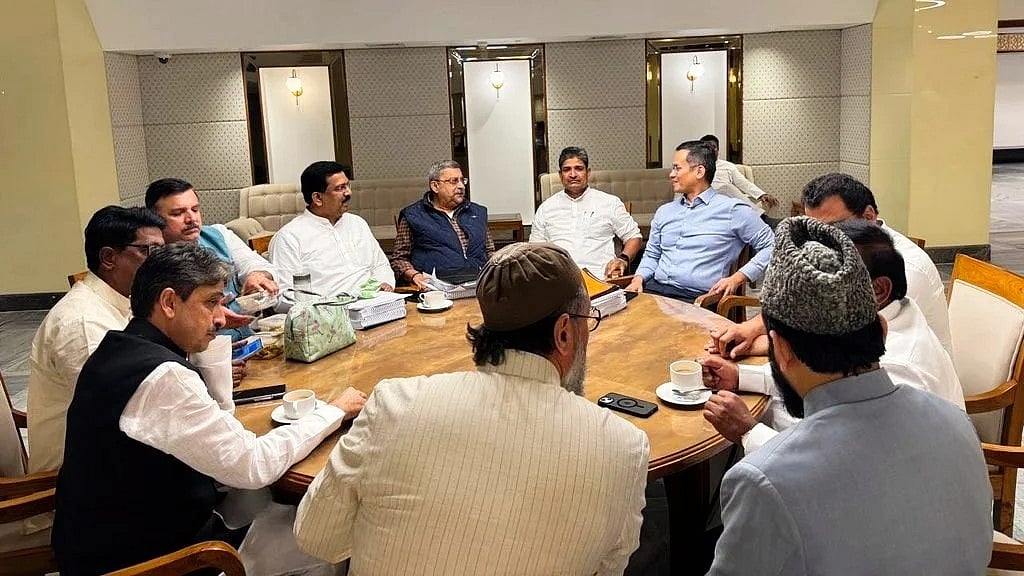Nation
Why is the Opposition boycotting the JPC on Constitution Amendment Bill?
The 31-member panel is a pointer to the fact that when opposition voices are sidelined, powerful majorities risk undermining parliamentary scrutiny weakening India’s democracy

The decision by major opposition parties to boycott the 31-member Joint Parliamentary Committee (JPC)—constituted by the Lok Sabha Speaker this week to examine the Constitution (130th Amendment) Bill—brings into sharp relief the growing crisis of democratic accountability in India. Tabled in Parliament on 20 August 2025 by Union home minister Amit Shah, the Bill proposes automatic disqualification of the Prime Minister, ministers and chief ministers if they remain in jail for 30 days on serious offences. While framed as a tool to fight corruption, opposition leaders widely see the Bill as a political weapon aimed at destabilizing opposition-ruled states and suppressing dissent.
Headed by BJP MP Aparajita Sarangi, the committee comprises 21 MPs from the BJP and its allies and 10 more from AIMIM, NCP (Sharad Chandra Pawar), SAD (Badal), BJD, YRCP and others.
While the opposition had opposed the introduction of the Bill itself, alleging that the government’s intention was malafide, the Speaker too took his time in constituting the committee, having asked parties to suggest names only in October. Eventually, parties belonging to the INDIA bloc decided to stay away, concluding that participation was meaningless as the BJP with majority support in the JPC will in any case ignore the recommendations and suggestions made by the opposition. The experience with the Waqf Bill was cited by the Opposition to indicate the futility of the JPC.
Published: undefined
The government justified the urgency of the Bill by claiming that there was a ‘new trend’ of ministers and chief ministers not resigning even after being sent to jail, the opposition argued that such instances were rare and did not warrant a wholesale change in the law. While the government had referred to a minister from Tamil Nadu and former Delhi chief minister Arvind Kejriwal and another AAP minister from Delhi, they were exceptions rather than the rule, the Opposition argued.
The opposition MPs also asked why the government had not bothered to consult the opposition and evolve a consensus before drafting the Bill. The opposition also cited the example of the Joint Parliamentary Committee on the Bofors case in 1987 which was boycotted by six major Opposition parties including the BJP, TDP and the AGP because a majority of the members were from the Congress, which had then over 400 MPs in the Lok Sabha alone.
Published: undefined
“The real objective of this bill is not to fight corruption but to topple governments, break parties, indulge in horse trading, trap Opposition leaders in false cases, send them to jail, and force their resignations,” argued AAP MP Sanjay Singh. It was difficult to believe that the BJP is seriously concerned about corruption, he had added. “The BJP and Narendra Modi are in love with corruption and the corrupt. Ajit Pawar, Narayan Rane, Chhagan Bhujbal, Hasan Mushrif, G. Janardhana Reddy, B.S. Yediyurappa, Mukul Roy, and Suvendu Adhikari from the Saradha-Narada scam, Himanta Biswa—which party are all these corrupt leaders in today?” he asked.
The opposition also cited the example of Jharkhand CM Hemant Soren, who was hounded and finally arrested by the Enforcement Directorate and sent to jail on the charge that he had illegally acquired government land. While Soren did resign as chief minister before being arrested, the charges were not proved and he not only ensured that the government remained in office but after he was released by the High Court, he led his party to victory in the next election.
Trinamool Congress’s Rajya Sabha leader Derek O’Brien, in a newspaper column, noted that members of the JPC were nominated by parties based on their strength in the House. “So, the ruling party or coalition, with larger numbers, dominates. Also, the recommendations of the JPC are only advisory in nature and the government is not bound to act on them.”
“These Bills are clearly aimed to destabilise elected governments in Opposition-ruled States. They were introduced with malice. Our presence in the panel is unlikely to have a significant impact on the sum and substance of the legislation,” Rajya Sabha member and senior Samajwadi Party leader Javed Ali Khan said.
Published: undefined
The Constitution (130th Amendment) Bill is part of a trio of bills including the Government of Union Territories (Amendment) Bill and the Jammu and Kashmir Reorganisation (Amendment) Bill all converging on the same objective—to forcibly remove ministers with criminal cases, irrespective of presumption of innocence or judicial outcome.
The Opposition’s refusal to join the JPC must be seen as a symptom of erosion, not of parliamentary democracy itself. When meaningful debate is foreclosed, when committees serve as political tools rather than forums of scrutiny, democratic mechanisms falter. This undermines trust not only in the legislative process but in the Constitution and institutions that sustain India’s pluralistic democracy.
Published: undefined
Follow us on: Facebook, Twitter, Google News, Instagram
Join our official telegram channel (@nationalherald) and stay updated with the latest headlines
Published: undefined